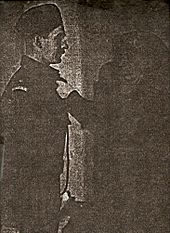- Glyn Gilbert
-
Glyn Gilbert 
Glyn Gilbert receives the Military Cross from Field Marshal MontogomeryBorn 1920 Died 26 September 2003 Allegiance  United Kingdom
United KingdomService/branch  British Army
British ArmyYears of service 1939-1974 Rank Major-General Commands held 44th Parachute Brigade
3rd DivisionBattles/wars World War II Awards Companion of the Order of the Bath
Military CrossMajor-General Glyn Charles Anglim Gilbert CB MC (1920 - 26 September 2003) was a 20th century British military officer who served during World War II. In 1970 he became the highest ranking Bermudian military officer when he was promoted to the rank of Major General in the British Army.
Contents
Early life
He was born into a family of Gilberts with its roots in the 17th Century settlement of Bermuda.[1] His father, Major Charles Gray Gosling Gilbert, OBE, MC, was the long-time head of the Colony's education department[1] (the school of Gilbert Institute, in Paget, is named for him). Charles Gilbert had been studying in England when the Great War began and took an army commission, serving in the Machine Gun Corps. Glyn Gilbert was born in England, where his father worked briefly after leaving the Army on the end of the Great War. Raised in Bermuda, Glyn was sent to Eastbourne College in England.[1] After finishing school the year before the start of the Second World War, and anticipating the coming conflict, Glyn returned briefly to Bermuda before enrolling at the Royal Military College at Sandhurst.[1] The 1939 class of officer cadets was hurried through its training, and Glyn was commissioned into the Lincolnshire Regiment.[1] Two contingents from the Bermuda Volunteer Rifle Corps (BVRC) had served with the Lincolnshire Regiment on the Western Front, during World War I. Since the 1920s, the affiliation between the two units had been given official sanction, with the Lincolns taking a paternal relationship to the BVRC, akin to that with its own Territorial battalions. The BVRC would send drafts to the Lincolns again, in 1940, and 1944.
Service in World War II
In 1944, Major Gilbert, as Officer Commanding "C" Company, 2 Lincolns, was one of only two Bermudians to land on the beaches of Normandy. He later earned the immediate award of the Military Cross (MC) in the crossing of the Escaut Canal, part of a larger operation to cross the Rhine.[1] He, and another Company Commander involved, was decorated with the medal by Field Marshal Montgomery, personally. As Gilbert put it, 'later that day [of the crossing], the ribbon was pinned on while we were still in the field. The next day we were relieved by a contingent of Bermudians', which included his cousin, Lieutenant Ambrose Gosling. The Bermudians were part of a draft of Lincolns sent from England, under the command of Bermudian Major Anthony W. F. Smith, who was killed in action shortly thereafter. Glyn ended the War in Northern Germany, where 2 Lincolns had taken part in the capture of Bremen.[1] He was one of four Bermudians to attain the rank of Major in the Lincolns during the War.
Post-war service
After the War, Gilbert attached to the Third Battalion of the Parachute Regiment (3 Para), serving in Palestine.[1] He moved through a number of subsequent positions, ultimately transferring wholly to the Parachute Regiment. In 1962, Gilbert was appointed Regimental Colonel of the Parachute Regiment. In that position, he was responsible for a number of significant changes, including the introduction of a battle training course for NCOs at Brecon, which was eventually made mandatory throughout the Infantry, and the creation of the Red Devils parachute display team.[2] Following this, he was promoted to Brigadier General, in command of the Territorial Army’s 44th Parachute Brigade.[3] After attending the Imperial Defence College, Gilbert became Commandant of the School of Infantry, Warminister, in 1967.[3] While there, he hosted HM the Queen in his own home when she visited the school. He was promoted to Major-General in 1970 and appointed General Officer Commanding 3rd Division[3] before he retired from the Army in 1974.[1]
Maj.-Gen. Gilbert also played a pivotal role in the development of the Bermuda Regiment, the Bermudian territorial unit formed in 1965 by amalgamating the BVRC (retitled the Bermuda Rifles) with the Bermuda Militia Artillery. The Bermuda Regiment's original strength was about 400, all ranks. Following discipline problems during an exercise in the West Indies, a report on the unit was commissioned from Maj-General Gilbert, who also took into account the difficulties the Regiment subsequently experienced in meeting its obligations when embodied during the civil unrest of 1977. He made a number of recommendations, including the increase of the Regiment's strength to a full battalion of about 750, with three rifle companies and a support company.
Glyn Gilbert died in 2003, at the age of 83.[1]
See also
References
External links
- The Royal Gazette, Obituary, September 29. 2003.
- Second Lincolnshire Regiment, Personal Recollections of Major General Glyn Gilbert MC regarding Operation Charnwood.
- Operation Charnwood (pdf)
- POTSI: Maj-Gen Gilbert
Military offices Preceded by
Terence McMeekinGeneral Officer Commanding the 3rd Division
1970–1972Succeeded by
Richard WorsleyCategories:- 1920 births
- 2003 deaths
- Bermudian soldiers
- British Army generals
- British Parachute Regiment officers
- Companions of the Order of the Bath
- Military of Bermuda
- Recipients of the Military Cross
- Sandhurst graduates
- Royal Leicestershire Regiment officers
- British Army personnel of World War II
- British military personnel of the Palestine Emergency
- Old Eastbournians
Wikimedia Foundation. 2010.
